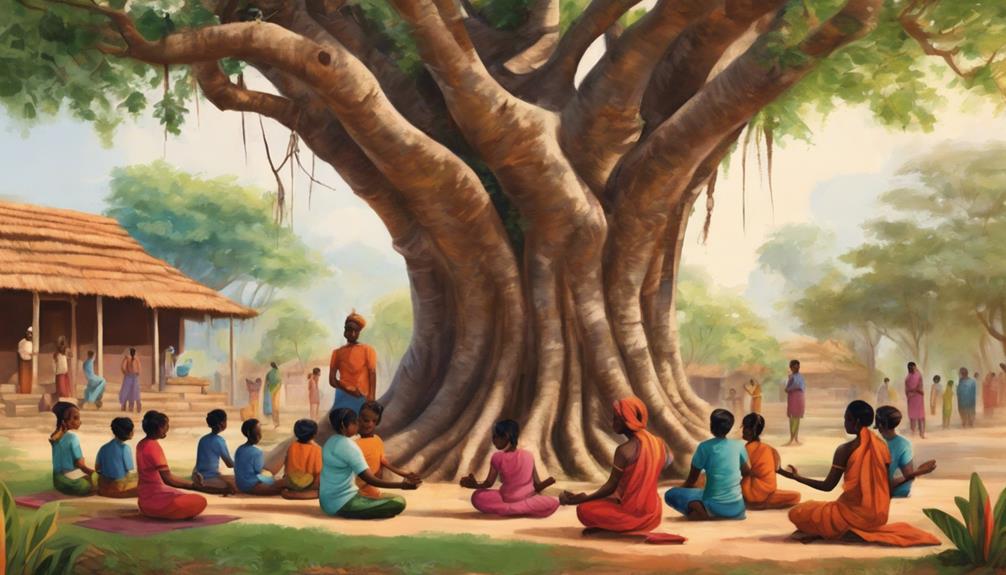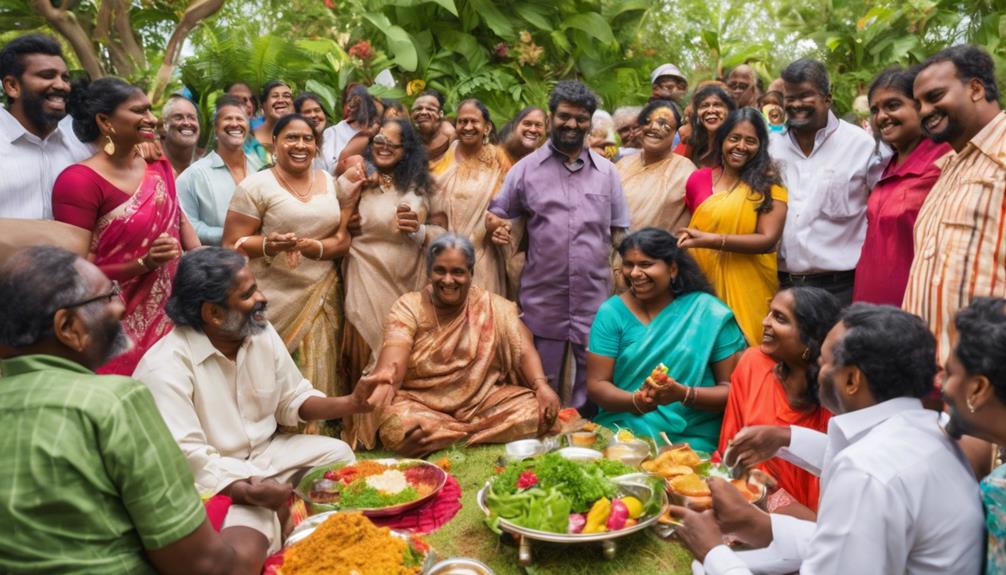When health is lost, it deeply affects your identity, emotions, and connections with others. In Tamil culture, good health isn't just physical; it's woven into your spiritual and mental well-being too. Health is often seen as wealth, and losing it can lead to feelings of sadness or even isolation. Family and community play essential roles in supporting you during these times, offering love and care that promotes healing. Understanding this interconnectedness can help you navigate through health challenges more effectively. If you want to explore how to cultivate resilience in such moments, there's much more to discover.
Cultural Significance of Health

In Tamil culture, health isn't just a personal matter; it's a significant aspect that influences family dynamics, community relationships, and overall well-being. When you think about health, you often consider physical wellness, but it's important to recognize that Tamil beliefs embrace holistic health. This perspective emphasizes the interconnectedness of physical, mental, and spiritual wellness.How Do I Become A Yoga Instructor
You'll find that many Tamil families prioritize practices that foster this balance. For instance, incorporating traditional diets rich in nutrients not only supports physical health but can also enhance mental clarity and emotional stability. Spiritual wellness plays a considerable role too, as participating in community rituals and family gatherings strengthens social ties and fosters a sense of belonging, which is essential for mental health.
Moreover, the Tamil approach to health often involves preventive care, considering the whole person rather than just treating symptoms. By focusing on holistic health, you're encouraged to engage in practices that nurture your body, mind, and spirit. This integrated approach helps cultivate resilience within families and communities, ensuring that health remains a shared value, crucial for harmony and well-being.
Tamil Proverb Interpretations
Tamil proverbs offer profound insights into health and well-being, reflecting the culture's deep-rooted wisdom and values. These sayings often emphasize the importance of maintaining good health, illustrating how it's intertwined with one's overall quality of life.
For instance, a common proverb might convey that 'health is wealth,' reminding you that without health, material riches mean little.
Understanding the proverb origins helps you appreciate the context in which these sayings emerged. Many stem from generations of lived experiences, where the community's collective health wisdom evolved.
They serve as reminders that taking care of your body is a priority, as neglect can lead to dire consequences.
Health and Personal Identity

Your health plays an essential role in shaping your personal identity, influencing how you perceive yourself and how others see you. When you're healthy, you often feel confident and capable, but an illness or health challenge can trigger an identity crisis. Suddenly, you might question who you're beyond your physical abilities.
Your health perception deeply impacts your self-esteem and how you interact with the world. If you see yourself as strong and vibrant, it boosts your confidence and helps you forge relationships. However, if health issues arise, you may struggle with feelings of inadequacy or vulnerability, altering how you view yourself and how others perceive you.
This shift can lead to anxiety and fear about your identity, making it essential to engage in self-reflection and seek support. Reassessing your values and strengths can help you rebuild your sense of self amidst health challenges.
Emotional Impact of Illness
Illness can profoundly affect your emotions, often leading to feelings of sadness, frustration, and isolation as you navigate the challenges it brings. You might find it difficult to maintain your mental wellness, as the physical symptoms can overshadow your emotional state. Each day may feel like an uphill battle, impacting your mood and overall outlook on life.
However, it's essential to remember that developing emotional resilience during this time is possible. You can take steps to bolster your mental strength by engaging in activities that bring you joy, practicing mindfulness, or seeking support from loved ones. Journaling your thoughts and feelings can also provide clarity and help you process your emotions.
Recognizing that it's okay to feel overwhelmed is a significant part of the healing journey. By acknowledging your feelings, you can work on coping strategies that promote mental wellness. Surrounding yourself with positive influences, whether through friends or uplifting media, can help shift your perspective.
Ultimately, while illness may challenge your emotional state, focusing on building emotional resilience can empower you to cope and thrive despite the difficulties you face.
Community Support in Tamil Culture

In Tamil culture, community support plays an essential role in maintaining health and well-being.
You'll find that traditional healing practices often integrate family care dynamics, where relatives come together to provide emotional and physical support.
Temples also serve as a cornerstone for community bonding, offering a space for shared rituals that foster a sense of belonging and uplift those in need.
Traditional Healing Practices
Traditional healing practices in Tamil culture often draw upon deep community ties, where support and shared knowledge play essential roles in promoting well-being.
You'll find that many individuals rely on Ayurvedic remedies and herbal treatments, passed down through generations. These methods not only address physical ailments but also encompass emotional and spiritual health.
In your community, you might notice the elderly sharing their wisdom about natural remedies, using local herbs like neem and turmeric for various conditions. This collective knowledge fosters a strong sense of belonging, as people come together to discuss and exchange healing practices.
Moreover, you may encounter gatherings where herbal treatments are prepared in unison, reinforcing bonds among community members. Often, these healing sessions are infused with rituals and prayers, highlighting the importance of spirituality in recovery.
Family Care Dynamics
Community support in Tamil culture extends beyond traditional healing practices, as family care dynamics play a significant role in nurturing individuals during times of need. When someone falls ill, it's not just the immediate family that steps in; the entire community often comes together to provide assistance.
You'll notice that family support becomes a cornerstone in these situations, with each member taking on specific caregiving roles. For instance, you might find siblings helping with daily chores, while grandparents offer emotional support and wisdom. Aunts and uncles may provide meals or take on childcare responsibilities, ensuring that everyone's needs are met. This collective effort not only alleviates stress for the primary caregiver but also strengthens familial bonds and community ties.
In Tamil culture, expressing love and care through action is essential. The act of caring is seen as a shared responsibility, emphasizing the importance of unity in times of crisis. By fostering these family care dynamics, you contribute to a supportive environment where healing becomes a communal effort, promoting both physical recovery and emotional well-being.
Role of Temples
Temples serve as essential hubs of support in Tamil culture, offering spiritual guidance and fostering connections among community members during challenging times. When you're facing health issues or personal crises, you'll often find solace in your local temple. These sacred spaces aren't just about worship; they're integral to your community's fabric.
Participating in temple rituals can greatly enhance your spiritual wellness. These rituals create a sense of belonging and provide a supportive network where you can share your struggles. The communal prayers, offerings, and celebrations help to uplift your spirits and remind you that you're not alone in your journey.
Additionally, temples often organize health camps and wellness programs, reinforcing their role as a community resource. You'll find that many temples encourage the practice of yoga and meditation, promoting both physical and mental well-being.
Traditional Healing Practices
In Tamil culture, healing practices rooted in ancient wisdom offer a holistic approach to well-being, integrating physical, emotional, and spiritual health.
You might find that Ayurvedic remedies play a significant role in this tradition. They focus on balancing the body's energies, using natural ingredients to treat various ailments. For instance, you could incorporate turmeric, ginger, and neem into your daily routine, as these herbs are known for their healing properties.
Herbal treatments are another essential aspect of traditional healing. By utilizing local plants and herbs, Tamil healers create concoctions tailored to individual needs. You may benefit from herbal teas or poultices that calm your mind and body, bringing you back to a state of equilibrium. These practices don't just treat symptoms; they aim to address the root cause of your discomfort.
As you explore these traditional methods, you'll likely feel a deeper connection to your heritage and the natural world. Embracing Ayurvedic remedies and herbal treatments can empower you on your journey toward holistic health, fostering a sense of balance and well-being in your life.
Finding Meaning Through Adversity

Adversity often serves as a powerful catalyst for personal growth, revealing deeper insights into your values and purpose in life. When faced with challenges, you're pushed to reevaluate what truly matters. This process can lead to adversity growth, helping you emerge stronger and more self-aware.
One effective way to navigate these tough times is by implementing resilience strategies. These strategies can include practicing mindfulness, fostering supportive relationships, and setting realistic goals. By focusing on these techniques, you can transform your perspective, turning obstacles into opportunities for learning and improvement.
It's essential to remember that growth doesn't happen overnight. Embracing the journey means allowing yourself to feel a range of emotions—fear, anger, or sadness—without judgment. You might find that sharing your experiences with others provides not only support but also new insights that can guide you.
Ultimately, finding meaning through adversity can lead to a more fulfilled life. As you develop resilience, you'll discover strengths you didn't know you had, paving the way for a deeper connection to your inner self and the world around you. Embrace this journey; it's a crucial part of your personal evolution.
Conclusion
In Tamil culture, health isn't just about the absence of illness; it's deeply tied to identity and community.
When health is lost, it can feel like losing a part of yourself, but remember, you're not alone.
Lean on your community for support, and explore traditional healing practices that honor your roots.
Through adversity, you can find new meaning and strength, reminding yourself that even in tough times, hope and resilience can flourish.
